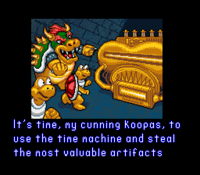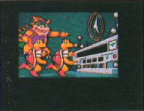Timulator: Difference between revisions
LinkTheLefty (talk | contribs) No edit summary |
LinkTheLefty (talk | contribs) mNo edit summary |
||
| Line 3: | Line 3: | ||
The '''Timulator'''<ref>''Mario's Time Machine'' SNES/NES instruction booklet, page 1.</ref> (referred to as the '''time machine''' in-game) is a time machine used by [[Bowser]] during the events of ''[[Mario's Time Machine]].'' The time machine has three settings: the City, the Date, and the Epoch (BC or AD). Once a destination is set the user then is required to surf through the fabric of time, collecting [[mushroom]]s. Once enough mushrooms are collected the user then enters a portal and is sucked into the destination programmed in the Timulator. If the user enters a portal too soon or has set a destination, not within the game's story (e.g. Menlo Park in 2001 AD), the user is dumped back in 1993 (the present). The Timulator also comes with a remote control device, which at the press of a button returns its user to 1993 from any area in time. | The '''Timulator'''<ref>''Mario's Time Machine'' SNES/NES instruction booklet, page 1.</ref> (referred to as the '''time machine''' in-game) is a time machine used by [[Bowser]] during the events of ''[[Mario's Time Machine]].'' The time machine has three settings: the City, the Date, and the Epoch (BC or AD). Once a destination is set the user then is required to surf through the fabric of time, collecting [[mushroom]]s. Once enough mushrooms are collected the user then enters a portal and is sucked into the destination programmed in the Timulator. If the user enters a portal too soon or has set a destination, not within the game's story (e.g. Menlo Park in 2001 AD), the user is dumped back in 1993 (the present). The Timulator also comes with a remote control device, which at the press of a button returns its user to 1993 from any area in time. | ||
Bowser initially uses the Timulator to travel to significant points of human history on [[Earth]], and snatch various artifacts to display in his [[Bowser's Museum|museum]]. Mario gains control of the Timulator to return the items to their proper places in the timeline before the timeline changes forever. In the [[MS-DOS]] and [[Super Nintendo Entertainment System|SNES]] versions, after Mario succeeds in restoring history back to normal and tracks down Bowser, Bowser attempts to use the Timulator and escape to "[[Paradise]]". If the player takes too long to return the artifacts or returns them in the wrong order, Bowser is successful. If the player returns the artifacts in the correct order quickly, the machine overloads, self-destructs and sends Bowser into the Cretaceous period, where he gets stomped by a large dinosaur. In the [[Nintendo Entertainment System|NES version]], Mario fights Bowser for the key to free [[Yoshi]]. | Bowser initially uses the Timulator to travel to significant points of human history on [[Earth]], and snatch various artifacts to display in his [[Bowser's Museum|museum]], such as [[Isaac Newton]]'s [[apple]]. Mario gains control of the Timulator to return the items to their proper places in the timeline before the timeline changes forever. In the [[MS-DOS]] and [[Super Nintendo Entertainment System|SNES]] versions, after Mario succeeds in restoring history back to normal and tracks down Bowser, Bowser attempts to use the Timulator and escape to "[[Paradise]]". If the player takes too long to return the artifacts or returns them in the wrong order, Bowser is successful. If the player returns the artifacts in the correct order quickly, the machine overloads, self-destructs and sends Bowser into the Cretaceous period, where he gets stomped by a large dinosaur. In the [[Nintendo Entertainment System|NES version]], Mario fights Bowser for the key to free [[Yoshi]]. | ||
==Trivia== | ==Trivia== | ||
Revision as of 17:34, October 25, 2021
It has been requested that at least one image be uploaded for this article. Remove this notice only after the image(s) have been added. Specifics: add the time machine in the DOS and NES versions.

The Timulator[1] (referred to as the time machine in-game) is a time machine used by Bowser during the events of Mario's Time Machine. The time machine has three settings: the City, the Date, and the Epoch (BC or AD). Once a destination is set the user then is required to surf through the fabric of time, collecting mushrooms. Once enough mushrooms are collected the user then enters a portal and is sucked into the destination programmed in the Timulator. If the user enters a portal too soon or has set a destination, not within the game's story (e.g. Menlo Park in 2001 AD), the user is dumped back in 1993 (the present). The Timulator also comes with a remote control device, which at the press of a button returns its user to 1993 from any area in time.
Bowser initially uses the Timulator to travel to significant points of human history on Earth, and snatch various artifacts to display in his museum, such as Isaac Newton's apple. Mario gains control of the Timulator to return the items to their proper places in the timeline before the timeline changes forever. In the MS-DOS and SNES versions, after Mario succeeds in restoring history back to normal and tracks down Bowser, Bowser attempts to use the Timulator and escape to "Paradise". If the player takes too long to return the artifacts or returns them in the wrong order, Bowser is successful. If the player returns the artifacts in the correct order quickly, the machine overloads, self-destructs and sends Bowser into the Cretaceous period, where he gets stomped by a large dinosaur. In the NES version, Mario fights Bowser for the key to free Yoshi.
Trivia
- In the first page of the SNES version's instruction booklet, there is a very rough version of Bowser and his Koopas with the Timulator; the latter resembles the DOS version, although it is still a different design.
References
- ^ Mario's Time Machine SNES/NES instruction booklet, page 1.
